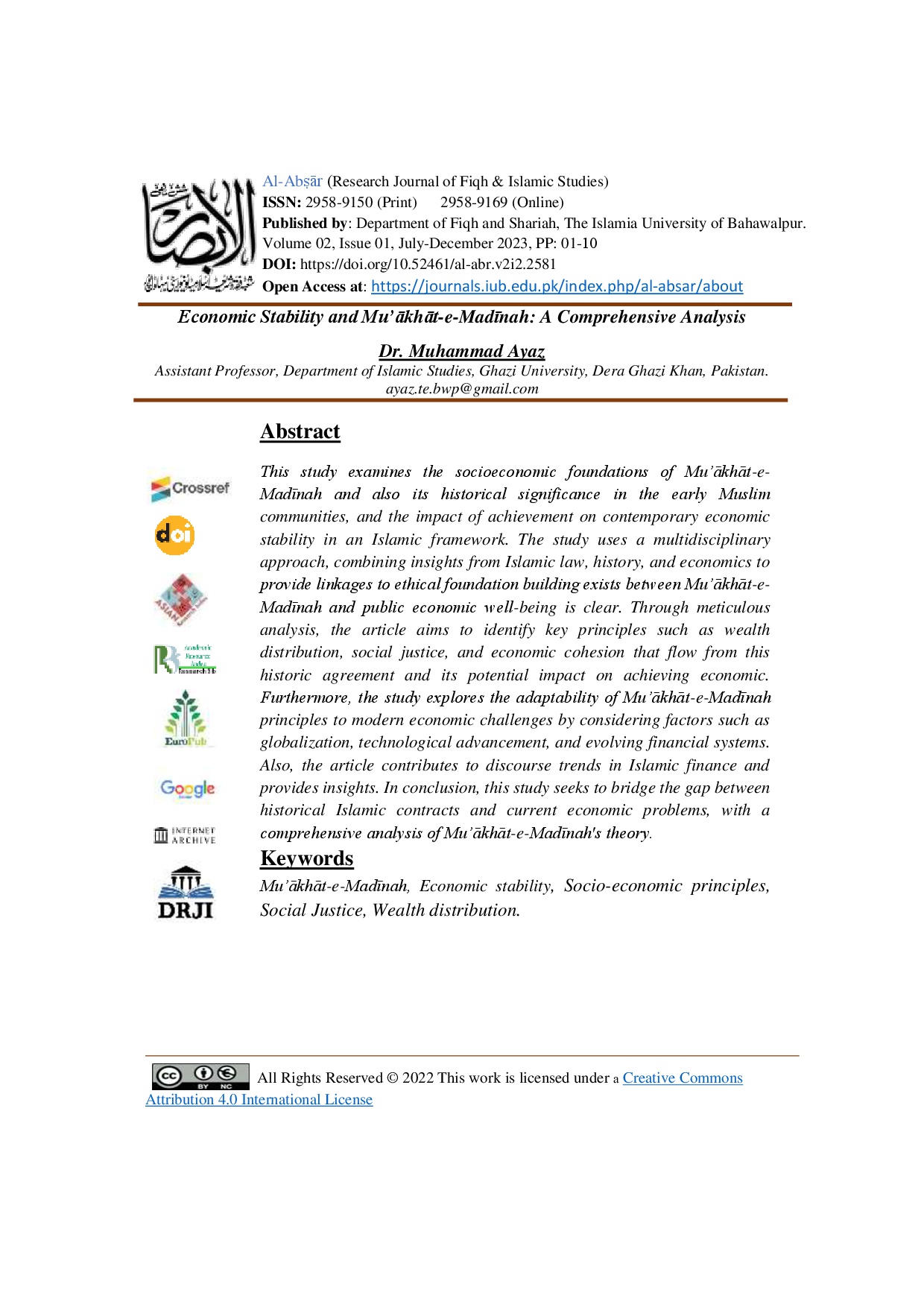Economic Stability and Mu’ākhāt-e-Madīnah: A Comprehensive Analysis
DOI:
https://doi.org/10.52461/al-abr.v2i2.2581Keywords:
Mu'akhat Madinah, Economic stability, Socio-economic principles, Wealth distribution, Social justiceAbstract
This study examines the socioeconomic foundations of Muakhat Medina and also its historical significance in the early Muslim communities, and the impact of achievement on contemporary economic stability in an Islamic framework. The study uses a multidisciplinary approach, combining insights from Islamic law, history, and economics to provide linkages to ethical foundation building exists between Muakhat Medina and public economic well-being is clear. Through meticulous analysis, the article aims to identify key principles such as wealth distribution, social justice, and economic cohesion that flow from this historic agreement and its potential impact on achieving economic. Furthermore, the study explores the adaptability of Muakhat Madina principles to modern economic challenges by considering factors such as globalization, technological advancement, and evolving financial systems. Also, the article contributes to discourse trends in Islamic finance and provides insights. In conclusion, this study seeks to bridge the gap between historical Islamic contracts and current economic problems, with a comprehensive analysis of Muakhat Medina's theory.
References
Ibn Ishaq, Sirat Rasul Allah, Translated by Alfred Guillaume, Oxford University Press, 1955, P.231.
Ibid.
Ibn Hisham, The Life of the Prophet Muhammad, Translated by A. Guillaume, Dar al-Andalus Limited, 1955. P. 180-200.
Ibn Ishaq, The Life of Muhammad, Translated by Alfred Guillaume, P. 231-245.
Ibn Hisham, The Life of the Prophet Muhammad, Translated by A. Guillaume, P. 180-200.
Al-Qardawi, Yusuf, Fiqh al-Zakat: A Comparative Study, Islamic Book Trust, 1999, P. 32.
Ramadan, Tariq, In the Footsteps of the Prophet: Lessons from the Life of Muhammad, Oxford University Press, 2007, P. 45.
Al-Sadr, Muhammad Baqir, Our Economy: Its Origin and Its Essence, Translated by H. Algar, IB Tauris, 1987, P. 66.
Ibn Ishaq, The Life of Muhammad, Translated by Alfred Guillaume, P.231-245.
Al-Sadr, Our Economy: Its Origin and Its Essence, Translated by H. Algar, P. 69.
Ibn Ishaq, The Life of Muhammad, Translated by Alfred Guillaume, P. 231-245.
Al-Sadr, Our Economy: Its Origin and Its Essence, Translated by H. Algar, P. 69.
Kamali, Mohammad Hashim, Principles of Islamic Jurisprudence, Islamic Texts Society, 2003. Pages 335-345.
Ramadan, Tariq, Islam, the West and the Challenges of Modernity, Islamic Foundation, 2001, P.23.
Al-Sadr, Our Economy: Its Origin and Its Essence." Translated by H. Algar, P. 68.
Yunus, Muhammad, Banker to the Poor: Micro-Lending and the Battle Against World Poverty, Public Affairs, 2003. P. 153-172.
Al-Sadr, Our Economy: Its Origin and Its Essence, Translated by H. Algar, P.69.
Warde, Ibrahim, Islamic Finance in the Global Economy, Edinburgh University Press, 2000, P. 25.
Kamali, Principles of Islamic Jurisprudence, P.335-345.
Ramadan, Tariq, In the Footsteps of the Prophet: Lessons from the Life of Muhammad, P.45.

Downloads
Published
How to Cite
Issue
Section
License
Copyright (c) 2022 Dr. Muhammad Ayaz

This work is licensed under a Creative Commons Attribution-NonCommercial 4.0 International License.





